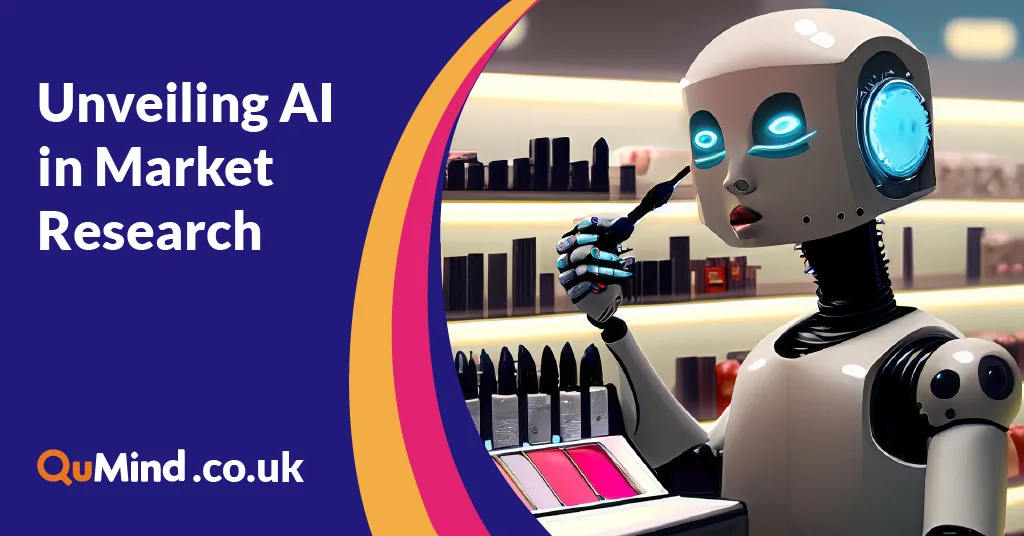Artificial intelligence (AI) is rapidly transforming the market research industry. AI-powered tools are already helping researchers to automate tasks, collect and analyse data more efficiently, and gain deeper insights into consumer behaviour. There are obvious benefits and possibilities for future development, but there should also be an element of safeguarding when utilising this relatively new tech.
Current Advancements
Some of the current advancements in AI-powered market research can already be seen to be shortening the research cycle, including:
- Automated data collection and analysis: AI can automate many of the time-consuming tasks involved in market research, such as data collection, cleaning, and analysis. This, in turn, frees up researchers to focus on more strategic and creative work, relieving many pressure points within market research teams.
- Easier user interface: Using AI to provide a user friendly data interrogation tool allows the ordinary user to have access to much deeper and more meaningful information by using open questioning techniques. This gets to the very heart of the consumer decision making process and de-risks business decisions.
- Predictive analytics: AI can be used to predict future trends and consumer behaviour. Qualitative data such as customer interviews, transcripts and open-ended survey responses can be analysed allowing for the identification of emerging sentiments and themes, helping businesses to make better, wiser decisions about product development, marketing, and sales.
- Quantitative research personalised insights: AI algorithms can segment the market based on criteria specified, allowing companies to identify and generate personalised insights into specific customer segments with distinct preferences and needs. This information can help businesses to create more targeted and effective marketing campaigns.
- As a pioneer of market research tech, QuMind has already instigated a number of “firsts” including the creation of a new generative AI tool which means reports can be created in minutes….not days. This is a major time saver and therefore money saver!

What does this mean for Market Research in the Future?
AI is still in its early stages of development, but it has the potential to revolutionise market research in a number of ways. There’s a true need to rethink how market research could and should work for the future.
- Make research more accessible: It’s a fine line for businesses to balance the need for good research and the costs involved. However, AI has the potential to significantly reduce the costs associated with market research, making it accessible to smaller businesses. Self-serve platforms offer comprehensive market research solutions, levelling the playing field for SMEs. This in turn could be the driving force for traditional market research firms to evolve into consultative partners as businesses seek previously unattainable insights.
- Develop new research methods: AI could be used to develop new and innovative ways to collect and analyse data. This could lead to new insights into consumer behaviour that are not currently possible. We need to ask, at what point does the traditional survey become obsolete?
- Encourage the rise of the AI Assistant: Using AI Assistants could bring about a major change in the way in which researchers work, giving them back much valued time.
Develop Market Research Consultancy/Expertise: As with any major industry changes, there are destined to be changes in job structures within teams. At the junior end, AI may replace some tasks, and scripting and coding roles may no longer be needed. However, AI is not infallible. Anyone who has used Chat GPT or Bard for research will know this. This leads the way for true market research experts to guide the analysis towards meaningful results. A change in staffing structure is a strong possibility.
- Personalise the research process: AI could be used to personalise the research process for each individual participant. This could make research more engaging and informative for participants, and it could lead to more accurate and reliable data.
- Provide end-to-end automated research process: In the future, AI could be used to automate the entire market research process, from data collection to analysis to reporting. This would free up researchers to focus on more strategic and creative work.
Safeguarding against Deception

While AI has the potential to revolutionise market research, it is important to be aware of the potential for deception. For example, AI could be used to generate fake data or to create deep fakes that are indistinguishable from real videos and audio recordings.
Death of the Survey Panel
We’ve briefly alluded to whether the survey panel would be necessary if predictive AI could be used to replace this methodology. But then there are questions to be raised about the accuracy of such results and whether the data could indeed be manipulated. A recent published article from https://algorithmwatch.org/en/bing-chat-election-2023/ shows the problems anticipated in future elections with fake poll numbers and fake candidates. This is where the expertise of the market research professional will become ever more important, in deciphering reality.
It is important for market researchers to be aware of these risks and to take steps to safeguard against deception.
AI is a powerful tool that can help market researchers to collect and analyse data more efficiently, gain deeper insights into consumer behaviour, and make better decisions. However, it is vital to be aware of the potential for deception and to take steps to safeguard against it.



